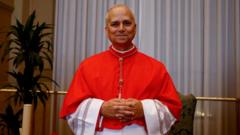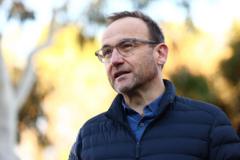The waiting continues for the next pope as black smoke emerged from the Sistine Chapel chimney, indicating no decision was reached during the second day of the conclave. The cardinals' voting process is complicated by emerging divisions and differing priorities among their ranks.
Still No Pope: Black Smoke Signals Ongoing Cardinal Voting

Still No Pope: Black Smoke Signals Ongoing Cardinal Voting
As the conclave continues, the wait for a new pope extends with new ballots and divisions among cardinals.
The conclave to select the successor to Pope Francis remains ongoing, as indicated by the black smoke that billowed from the Sistine Chapel chimney on Thursday, signaling that the cardinals have not yet reached a decision in their second day of voting. The first ballot on Wednesday evening lasted over three hours, ending with similar disappointment as none of the candidates garnered the required two-thirds majority.
As crowds gathered again in St. Peter's Square, anticipation was palpable among those waiting for news of the election. The signal of black smoke drew sounds of disappointment from the onlookers, many of whom hoped for a pope to be elected soon. The cardinals, numbering 133, will continue their secret voting process throughout the day, with expectations of more ballots scheduled for the afternoon.
Pope Francis's death last month initiated this conclave, the first in over a decade, and has resulted in an unprecedented diversity of candidates. This rare assembly includes many cardinals appointed by Francis who may be unfamiliar with each other, potentially complicating discussions and the decision-making process.
In priming for secrecy during these proceedings, the conclave operates under extremely controlled conditions to ensure no outside influence affects the vote. So far, the absence of consensus has raised questions regarding the future direction of the church, as bishops wrestle with issues of inclusivity and tradition that divided the church during Francis's tenure.
The process to elect the new pontiff does not have a specified time frame; the cardinals will continue voting until a suitable candidate emerges. Historical context reminds us that previous conclaves have taken as short as a couple of days and as long as three years; thus, Cardinal Dolan of New York has anticipated a potentially longer conclave due to the cardinals' lack of familiarity with one another. The patience of those awaiting the election, both within the church and across the globe, will likely be tested as votes continue, united by the age-old process of selecting the new leader of the Roman Catholic Church.
As crowds gathered again in St. Peter's Square, anticipation was palpable among those waiting for news of the election. The signal of black smoke drew sounds of disappointment from the onlookers, many of whom hoped for a pope to be elected soon. The cardinals, numbering 133, will continue their secret voting process throughout the day, with expectations of more ballots scheduled for the afternoon.
Pope Francis's death last month initiated this conclave, the first in over a decade, and has resulted in an unprecedented diversity of candidates. This rare assembly includes many cardinals appointed by Francis who may be unfamiliar with each other, potentially complicating discussions and the decision-making process.
In priming for secrecy during these proceedings, the conclave operates under extremely controlled conditions to ensure no outside influence affects the vote. So far, the absence of consensus has raised questions regarding the future direction of the church, as bishops wrestle with issues of inclusivity and tradition that divided the church during Francis's tenure.
The process to elect the new pontiff does not have a specified time frame; the cardinals will continue voting until a suitable candidate emerges. Historical context reminds us that previous conclaves have taken as short as a couple of days and as long as three years; thus, Cardinal Dolan of New York has anticipated a potentially longer conclave due to the cardinals' lack of familiarity with one another. The patience of those awaiting the election, both within the church and across the globe, will likely be tested as votes continue, united by the age-old process of selecting the new leader of the Roman Catholic Church.






















